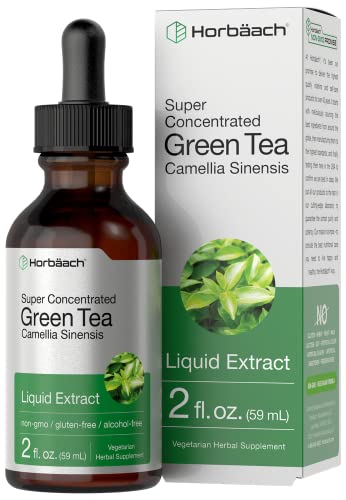
Is Green Tea Extract Safe for Everyone to Use?
Are you someone who is always on the lookout for natural remedies to improve your health? If so, you’ve probably come across the buzz around green tea extract. Known for its numerous health benefits, it’s no wonder why many people are turning to this herbal supplement. However, before diving headfirst into the green tea extract trend, it’s important to consider if it’s safe for everyone to use. In this blog post, we will explore the potential risks and benefits of green tea extract, helping you make an informed decision about whether it’s the right choice for you.
Top-selling Green Tea Extract Supplements






What is Green Tea Extract?
Green tea extract is a highly concentrated form of green tea, a popular beverage that has been enjoyed for centuries. It is derived from the leaves of the Camellia sinensis plant, the same plant that is used to make black tea and oolong tea. However, green tea extract is made using a different process that preserves the beneficial compounds found in the leaves.

Origins of Green Tea Extract
Green tea has its roots in ancient China, where it has been consumed for its medicinal properties for over 4,000 years. The Chinese have long believed that green tea promotes good health and longevity. Today, it is widely grown and consumed in various parts of the world, including Japan, India, and Sri Lanka.
How is Green Tea Extract Made?
Green tea extract is made by steeping the leaves of the Camellia sinensis plant in alcohol or a solvent, such as water or ethyl acetate. This process helps to extract the beneficial compounds present in the leaves. The extract is then concentrated through a series of filtration and drying processes to remove any impurities and create a potent powder or liquid form.
Benefits of Green Tea Extract
Green tea extract is known for its numerous health benefits, thanks to its rich concentration of bioactive compounds. Let’s take a closer look at some of its key benefits:
High in Antioxidants
Green tea extract is packed with antioxidants, which are compounds that help protect cells from damage caused by free radicals. These antioxidants, such as catechins and polyphenols, have been linked to a range of health benefits, including reduced inflammation, improved heart health, and a lower risk of chronic diseases.
Weight Management
Green tea extract has gained popularity as a natural weight management aid. Its active compounds, particularly catechins, have been found to boost metabolism and increase fat oxidation, potentially leading to weight loss. Additionally, green tea extract may help suppress appetite and reduce the absorption of dietary fat.
Improved Brain Function
The caffeine and amino acid L-theanine found in green tea extract have been shown to have positive effects on brain function. They can improve focus, attention, and alertness, while also promoting relaxation and reducing anxiety. Green tea extract may also have a protective effect against age-related cognitive decline.
Heart Health
Regular consumption of green tea extract has been associated with a reduced risk of heart disease. The antioxidants in green tea extract help lower levels of LDL (bad) cholesterol, reduce blood pressure, and improve blood lipid profiles. These effects may contribute to a healthier heart and a decreased risk of cardiovascular problems.
Boosted Immune System
Green tea extract contains compounds that may strengthen the immune system and support overall health. The catechins found in green tea extract have antimicrobial properties that can help fight off bacteria and viruses. Drinking green tea extract regularly may help reduce the risk of infections and support a healthy immune system.
Benefits of Green Tea Extract
Green tea extract has gained popularity in recent years due to its numerous health benefits. Packed with powerful antioxidants and other beneficial compounds, green tea extract has been studied extensively for its potential positive effects on overall health. In this blog section, we will explore some of the key health benefits associated with green tea extract, including its antioxidant properties and potential weight loss effects.

Antioxidant Powerhouse
One of the main reasons why green tea extract is highly regarded for its health benefits is its rich antioxidant content. Antioxidants are compounds that help protect our cells from damage caused by harmful free radicals. Green tea extract is particularly known for its high concentration of catechins, a type of antioxidant that has been shown to have potent health-boosting effects.
The antioxidant properties of green tea extract can have various benefits for our overall well-being, including:
- Reducing the risk of chronic diseases such as heart disease and certain types of cancer.
- Supporting immune function and helping to fight off infections.
- Promoting healthy aging by combating oxidative stress and protecting against age-related cellular damage.
Potential Weight Loss Aid
Another compelling benefit of green tea extract is its potential to aid in weight loss. Several studies have suggested that the combination of caffeine and catechins found in green tea extract may help enhance metabolism and promote fat burning. Here’s how green tea extract can potentially support weight loss efforts:
- Boosting Metabolism: Green tea extract has been found to increase metabolic rate, which can help burn more calories throughout the day.
- Fat Oxidation: The catechins in green tea extract have been shown to stimulate fat oxidation, leading to increased fat burning during exercise.
- Appetite Suppression: Some research suggests that green tea extract may help suppress appetite, making it easier to stick to a calorie-controlled diet.
Other Potential Health Benefits
In addition to its antioxidant power and potential weight loss effects, green tea extract has also been associated with several other health benefits. While more research is needed to fully understand these effects, some promising findings include:
- Brain Health: Green tea extract contains caffeine and other bioactive compounds that may improve brain function, memory, and focus.
- Heart Health: Regular consumption of green tea extract has been linked to a reduced risk of heart disease and improved cardiovascular health markers.
- Blood Sugar Control: Some studies have shown that green tea extract may help regulate blood sugar levels, making it beneficial for individuals with diabetes or at risk of developing the condition.
Potential Side Effects
Green tea extract has gained popularity in recent years due to its potential health benefits. It is believed to promote weight loss, boost metabolism, and provide antioxidant properties. However, it is essential to be aware of the potential side effects and risks associated with its use. In this blog section, we will discuss these potential side effects in detail to help you make an informed decision.

Interactions with Medications
When taking green tea extract, it is crucial to consider any medications you are currently taking. Green tea contains compounds that may interact with certain medications, leading to adverse effects. Some medications that may interact with green tea extract include:
- Anticoagulants: Green tea extract may increase the risk of bleeding when taken alongside blood-thinning medications like warfarin.
- Beta-blockers: Green tea extract may reduce the effectiveness of beta-blockers, which are commonly used to treat high blood pressure and heart conditions.
- Stimulants: Green tea extract contains caffeine, which can have additive effects when combined with other stimulant medications, potentially leading to increased heart rate and blood pressure.
It is important to consult with your healthcare provider before incorporating green tea extract into your routine, especially if you are taking any medications.
Possible Liver Damage
While green tea extract is generally considered safe when consumed in moderate amounts, there have been a few cases of liver damage associated with its use. These cases are rare, but it is essential to be aware of the potential risk.
- Symptoms of liver damage may include fatigue, abdominal pain, dark urine, and jaundice (yellowing of the skin and eyes).
- Individuals with pre-existing liver conditions or those who consume large amounts of green tea or green tea extract should exercise caution and speak with their healthcare provider.
Other Potential Side Effects
Apart from interactions with medications and potential liver damage, some individuals may experience other side effects when using green tea extract. These can include:
- Digestive issues: Green tea extract may cause stomach upset, nausea, diarrhea, or constipation in some individuals.
- Insomnia: Due to its caffeine content, green tea extract may interfere with sleep patterns, leading to insomnia or restlessness.
- Anxiety and irritability: The caffeine in green tea extract can also increase feelings of anxiety and irritability in some individuals.
- Allergic reactions: Rarely, some individuals may experience allergic reactions to green tea extract, characterized by rashes, itching, or difficulty breathing.
Who Should Avoid Green Tea Extract?
Green tea extract is a popular supplement that offers a wide range of health benefits. However, it may not be suitable for everyone. In this blog post, we will discuss the individuals who should avoid or use caution when using green tea extract.



Pregnant and Breastfeeding Women
Pregnant and breastfeeding women should exercise caution when consuming green tea extract. Although green tea is generally considered safe when consumed in moderate amounts, the high concentration of catechins found in green tea extract may pose a risk during pregnancy. Catechins are powerful antioxidants that can inhibit the absorption of iron and folic acid, which are essential nutrients during pregnancy. It is advisable to consult with a healthcare professional before using green tea extract during pregnancy or while breastfeeding.
Individuals with Certain Medical Conditions
Certain medical conditions may require individuals to avoid or limit their consumption of green tea extract. These conditions include:
- Liver Disease: Green tea extract contains a high concentration of catechins, which can increase the risk of liver damage in individuals with pre-existing liver conditions. If you have liver disease, it is best to avoid green tea extract or consult with a healthcare professional before using it.
- Heart Conditions: Green tea extract contains caffeine, which can stimulate the cardiovascular system. Individuals with heart conditions, such as high blood pressure or arrhythmia, should be cautious when using green tea extract as it may exacerbate these conditions. It is recommended to consult with a healthcare professional before incorporating green tea extract into your routine.
- Anxiety Disorders: Green tea extract contains caffeine, which can increase anxiety symptoms in individuals with anxiety disorders. If you have an anxiety disorder, it is advisable to limit your intake of caffeine, including green tea extract, or consult with a healthcare professional for guidance.
- Bleeding Disorders: The catechins in green tea extract can inhibit blood clotting. Therefore, individuals with bleeding disorders or those taking anticoagulant medications should exercise caution when using green tea extract.
- Stomach Disorders: Green tea extract can increase stomach acid production, which may worsen symptoms in individuals with stomach ulcers, acid reflux, or other stomach disorders. If you have a stomach disorder, it is best to avoid green tea extract or consult with a healthcare professional before using it.
Caffeine Sensitivity
Green tea extract contains caffeine, which can have various effects on individuals, depending on their sensitivity to caffeine. Some individuals may experience adverse effects, such as jitteriness, increased heart rate, or difficulty sleeping, even with small amounts of caffeine. If you are sensitive to caffeine, it is advisable to start with a low dosage of green tea extract or consider alternative supplements that are caffeine-free.
In Summary
While green tea extract offers numerous health benefits, it may not be suitable for everyone. Pregnant and breastfeeding women, individuals with certain medical conditions (such as liver disease, heart conditions, anxiety disorders, bleeding disorders, and stomach disorders), and those sensitive to caffeine should exercise caution or avoid green tea extract altogether. It is always best to consult with a healthcare professional before incorporating any new supplement into your routine.
Important Points to Remember:
- Pregnant and breastfeeding women should exercise caution when using green tea extract due to its high concentration of catechins.
- Individuals with liver disease, heart conditions, anxiety disorders, bleeding disorders, and stomach disorders should consult with a healthcare professional before using green tea extract.
- Green tea extract contains caffeine, so individuals sensitive to caffeine should start with a low dosage or consider caffeine-free alternatives.
Final Verdict: Assessing the Safety of Green Tea Extract for All Individuals
In conclusion, while green tea extract offers potential health benefits, its safety may vary depending on individual circumstances. Considering factors such as medical history, medications, and sensitivity to caffeine is crucial. Therefore, it is recommended to consult with a healthcare provider before incorporating green tea extract into one’s routine to ensure its safety and effectiveness.

Hey, I’m Ava Wilson—a skincare enthusiast and a certified esthetician. I’m dedicated to sharing my knowledge and empowering others to achieve healthy, glowing skin through simple, effective routines and natural remedies. Join me on this exciting skincare journey, and let’s unlock your skin’s potential for a confident, beautiful you.





